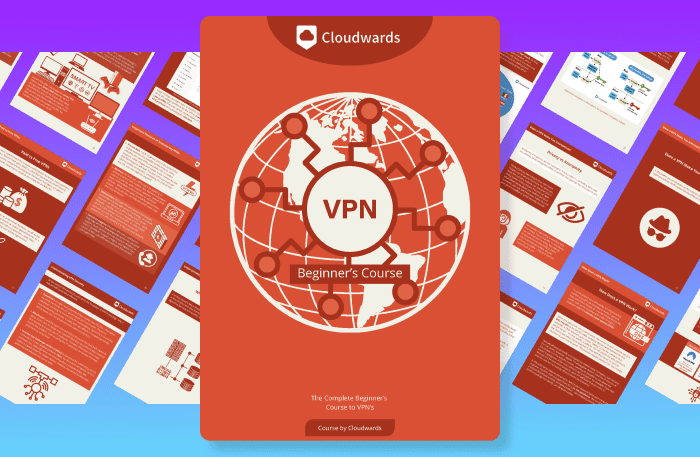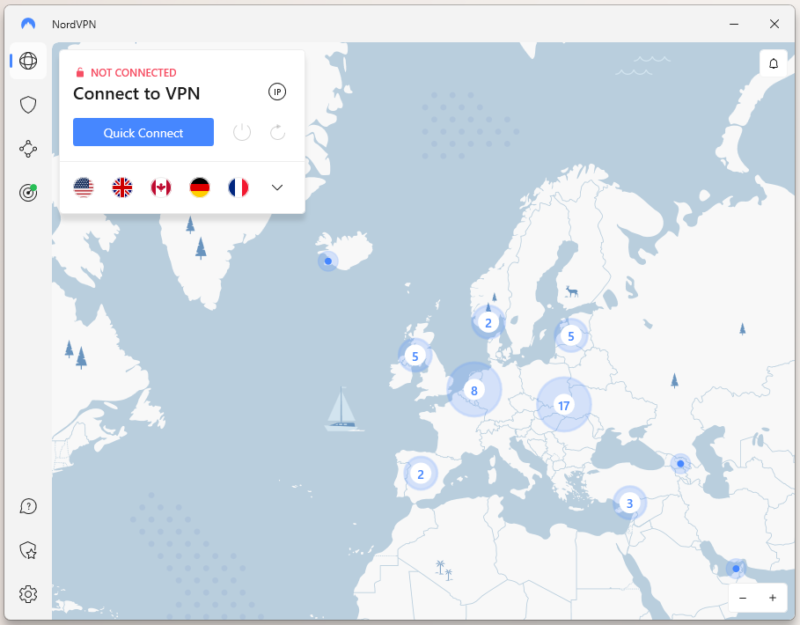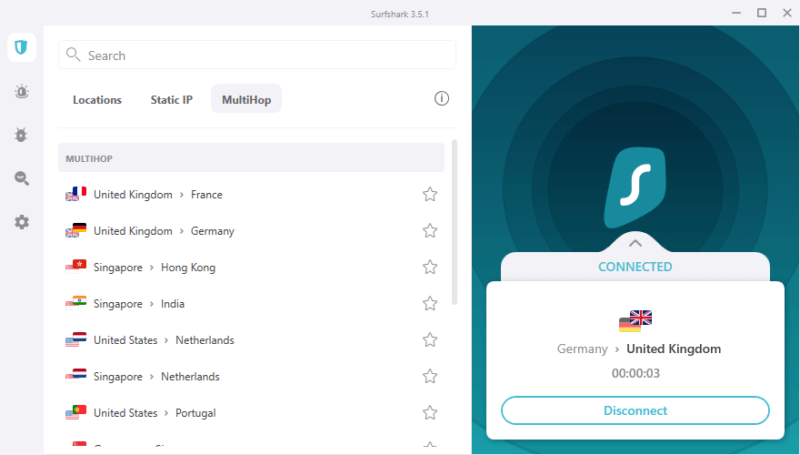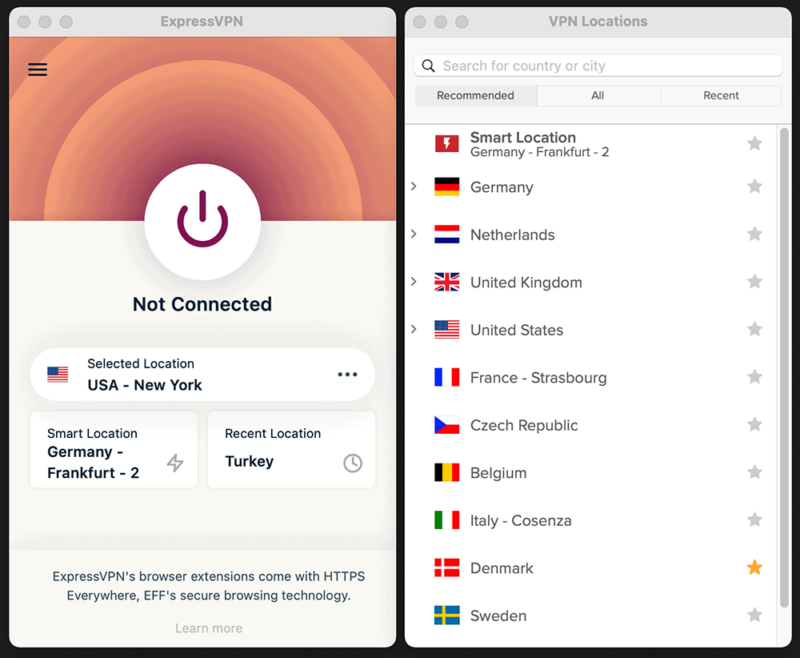Bandwidth vs Data Rate: 2025 Guide to VPN Speed Measurements
Learn the difference between bandwidth vs data rate and how they affect your internet speed and VPN performance. Discover what unlimited bandwidth and data really mean and what limits a VPN's speed in this in-depth article.
If you’ve tried to purchase a data plan or a VPN, you’ve probably seen the terms “bandwidth” and “data rate,” and you may even see them used interchangeably. However, they are not the same thing, as they describe different aspects of your internet connection. Read on to learn about bandwidth vs data rate and what it means when you see that a VPN has unlimited bandwidth or data.
Many VPNs claim to offer unlimited bandwidth, yet have very slow speeds. Likewise, your ISP might say you have a very high data rate, but your actual internet speed never reaches its peak. In this explainer on data rate vs bandwidth vs speed, we’ll explain how data rate and bandwidth impact your speed, especially when you’re connected to a VPN.
-
10/01/2024
We fine-tuned the article’s setup process and realigned the VPN order based on recent evaluations.
Bandwidth vs Data Rate Explained
You can think of your internet connection as a highway, with the cars being the data packets passing through. The bandwidth is the number of lanes on the highway, while the data rate is the speed the cars are driving at.
In broad terms, bandwidth refers to the maximum amount of data that can pass through your connection at the same time, whereas data rate refers to how fast that data passes through.
Protect Your Privacy. Get Our Free VPN Guide Now!

- Comprehend the essential role a VPN plays in safeguarding your digital life
- Gain a deep understanding of how VPNs function under the hood
- Develop the ability to distinguish fact from fiction in VPN promotions
How Your Signal Bandwidth Affects Your Maximum Data Rate
Both of these things affect the speed of your connection. If you have a maximum data transfer rate, that means the data packets have a limited speed, even if you have unlimited bandwidth. For example, if your maximum data rate is 10 Mbps, your connection can’t go any faster than that, even if your signal bandwidth is unlimited.
However, if you have a very high data rate and a limited bandwidth, the bandwidth limit will create a bottleneck, meaning that fewer data packets can go through simultaneously, again resulting in lower speed.
Bandwidth is typically measured in megabits per second (Mbps), much like your data rate; for a bandwidth of 1,000 Mbps, your top data rate is also 1,000 Mbps. However, if you have a maximum data rate of 1,000 Mbps, but a bandwidth limit of 800 Mbps, your actual data rate will be 800 Mbps, due to the bandwidth bottleneck.
Often, if you’re on a limited data plan, your internet service provider (ISP) will let you stay connected to the internet but slow down your connection. In this case, your bandwidth remains the same, but your data rate is artificially lowered, again resulting in a speed bottleneck.
VPN Bandwidth vs Speed vs Data Rate
As you can already tell by now, all three of these terms are very closely linked — so much so that they’re often treated as synonyms. So, how do they relate to VPNs, and what does it mean if a VPN says it offers unlimited bandwidth or data?
Data Rate vs Data Transfer Quote
Most often, when a VPN says it offers unlimited bandwidth, that means it places no artificial limits on your connection speed. However, when a VPN comes with unlimited data, that usually doesn’t refer to the data rate itself, but to your monthly allotted data transfer. Your data rate usually depends on your ISP, not your VPN.
Some VPNs — especially free ones — limit your data, and that limit applies to both downloads and uploads. For example, Windscribe’s free plan has a 15GB monthly data limit, which you can burn through pretty quickly if you’re streaming Netflix and making lots of video calls. Once you use up your data, you can’t use the VPN for the rest of the month, until your data quote refreshes.
What Limits a VPN’s Speed?
All VPNs decrease your speed to some extent. So even if your maximum data rate is 100 Mbps and the VPN has unlimited bandwidth, you likely won’t be hitting that maximum when you’re using a VPN; but we’re getting ahead of ourselves. First, let’s explain the different categories of your internet connection’s speed.
- Download speed — The speed at which you download files, watch online videos and receive data
- Upload speed — The speed at which you upload files, stream video (as in a video call or if you’re streaming on Twitch) and send data
- Latency (ping) — How quickly the end server responds to your input (most important for online gaming)
There are several factors that affect your VPN’s top speed:
- Distance from the VPN server — Physical distance impacts all three categories of speed, but mostly latency.
- VPN server hardware — If the VPN uses outdated server hardware, download and upload speeds will be slower.
- Server load — If a popular server location (like New York City) has a low server count, you’ll face congestion when traffic is high, impacting mostly download and upload speeds.
- VPN protocol and encryption — Although OpenVPN is a very secure VPN protocol, its code is a behemoth that takes a long time to process. This can result in slower speeds than the more modern WireGuard protocol, which has a much lighter code base.
This means that your VPN’s speed doesn’t depend solely on its bandwidth or data rate. Even a VPN with unlimited bandwidth and data rates will reduce your speed by some amount. Thankfully, the fastest VPNs should have a negligible impact on your network or internet connection speed, even on distant servers.
The Fastest VPNs
Here at Cloudwards, we run rigorous automated tests on our top VPNs to determine their speeds. Our top performers are NordVPN, Surfshark and ExpressVPN, all for different reasons. If you’re looking for a VPN that you can run in the background without even noticing it, try one of these VPNs out.
1. NordVPN — Fastest VPN Overall


Very Fast

Very Fast

Very Fast
Without a doubt, NordVPN is the fastest VPN on the market. Its speeds aren’t just great when you’re connecting to a nearby server; it keeps its consistency even if you’re connecting to the other side of the world.
NordVPN is pretty affordable, with a two-year plan that costs $3.01 per month. It also comes with a 30-day money-back guarantee on all plans. For more information, read our full NordVPN review.
- **VAT may apply
- Unlimited GB
- 10
- Yes
- *The prices are charged in the first billing cycle only. Renewal prices vary.
- Unlimited GB
- 10
- Yes
- *The prices are shown only apply for the first 12 months.
- Unlimited GB
- 10
- Yes
- **The prices are applicable only for the first 24 months. Secure, high-speed VPN Threat Protection Pro™: Anti-malware and advanced browsing protection Threat Protection Pro™: Ad and tracker blocker Password manager with Data Breach Scanner 1 TB of encrypted cloud storage Identity and SSN monitoring and alerts Credit monitoring services Up to $1M in identity theft insurance Up to $100K in cyber extortion insurance
- 10
2. Surfshark — Best Budget VPN with Fast Speeds


Very Fast

Very Fast

Very Fast
Despite having some of the fastest download and upload speeds in our testing, Surfshark falters when it comes to latency. Despite this, it’s still one of our favorite VPNs, with a massive network of servers worldwide.
Surfshark is also an affordable VPN, costing just $2.19 per month on a two-year plan, and also has a 30-day money-back guarantee. Our Surfshark review has more details about the service.
- Unlimited GB bandwidth, Unlimited devices, Secure VPN, Ad blocker, Cookie pop-up blocker. Pricing for the annual and biennial plans only apply for the first payment. Renewal fees vary.
- Unlimited GB
- Unlimited
- Yes
- Everything in Starter, plus Antivirus protection, Identity protection, Email Breach and Credit Card Alerts, Online Alias Pricing for the annual and biennial plans only apply for the first payment. Renewal fees vary.
- Unlimited GB
- Unlimited
- Everything in One, plus Data removal Pricing for the annual and biennial plans only apply for the first payment. Renewal fees vary.
- Unlimited GB
- Unlimited
3. ExpressVPN — Best Beginner-Friendly VPN with Fast Speeds


Very Fast

Very Fast

Very Fast
Thanks to its many advanced features and unmatched content unblocking ability, ExpressVPN is another VPN that ranks in our best VPN providers list. Its speeds are almost on par with NordVPN.
As a premium VPN, ExpressVPN is a bit more expensive, standing at $6.66 per month for a yearly plan, though it also comes with a one-month refund period. Read our ExpressVPN review for more.
Final Thoughts
Data rate and bandwidth are two aspects of your internet connection that affect its speed. Hopefully, you now have a better understanding of bandwidth, speed and data rates and how they relate to VPNs.
If you need a VPN with super high speeds across the board, you can’t go wrong with NordVPN. Experience the power of NordVPN yourself, risk-free, with the assurance that you can get your money back within 30 days if you’re not completely satisfied.
Does your VPN have unlimited bandwidth and data transfer? What’s your connection’s unprotected top speed, and does using a VPN slow it down a lot? Let us know in the comments below and, as always, thank you for reading.
FAQ
The main difference between bandwidth vs data rate is that bandwidth is the maximum amount of data that can pass through your connection at once, while the data rate is your internet’s top speed.
Bandwidth can affect the data rate by bottlenecking it. Your bandwidth limits how much data can go through in a given time period, so if your bandwidth is lower than your data rate, you’ll face limited speeds.
Yes, your data rate can be higher than your bandwidth, especially if you’re using a VPN with a limited bandwidth allowance.


